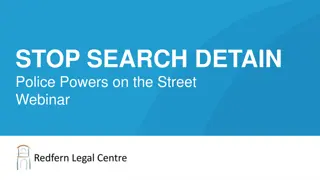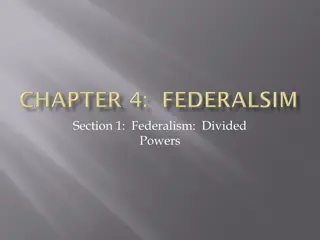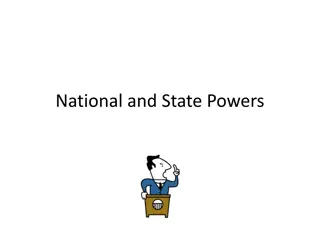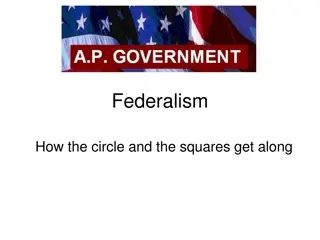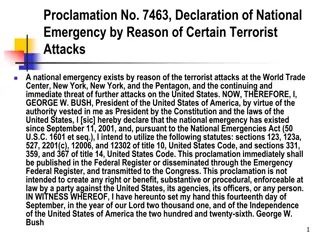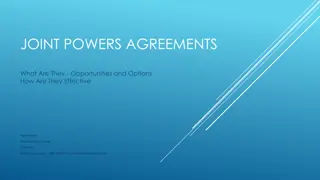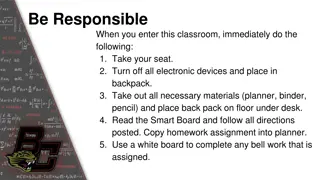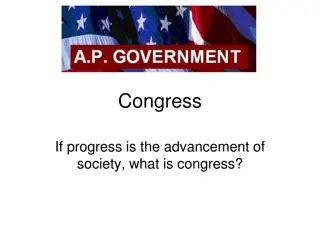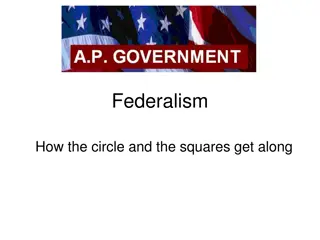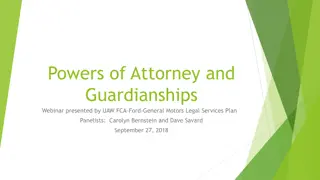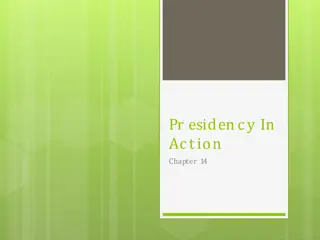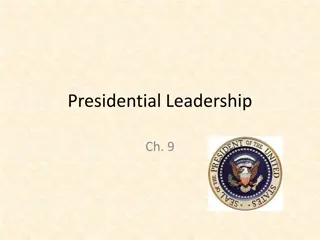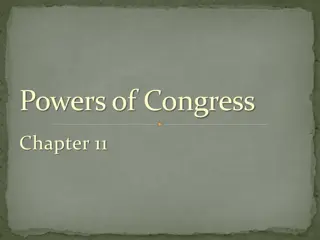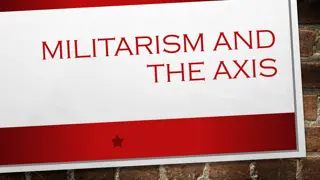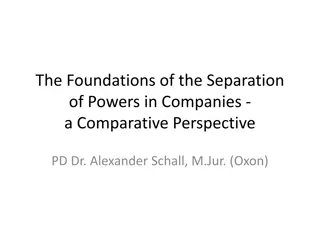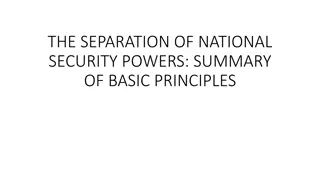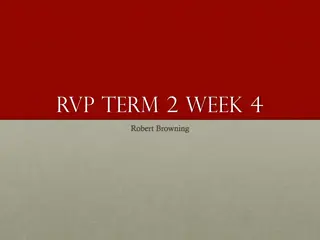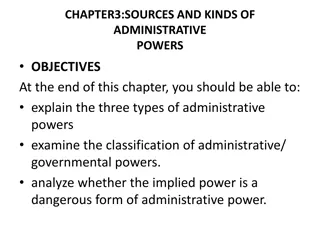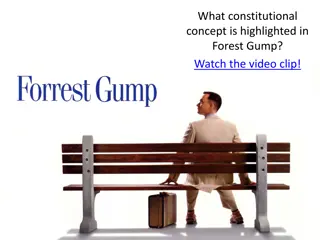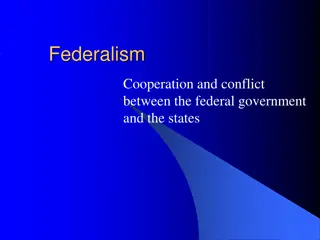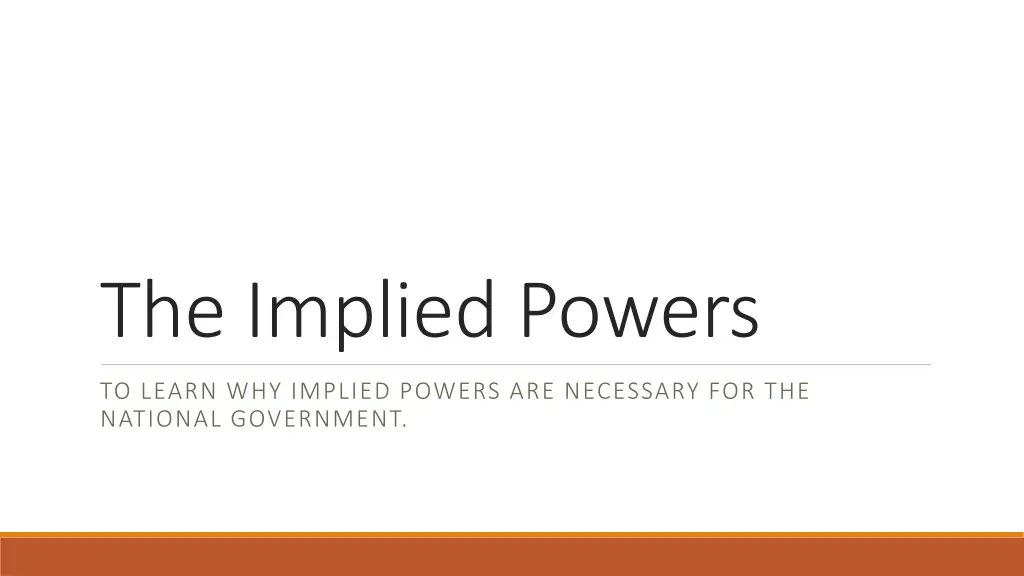
Understanding Implied Powers of the National Government
Explore the significance of implied powers for the national government through concepts like the Necessary and Proper Clause, Implied Powers of Congress, and the debate between strict and liberal constructionists. Discover how the Doctrine in Practice and Commerce Clause have shaped the exercise of implied powers in the U.S. government.
Download Presentation

Please find below an Image/Link to download the presentation.
The content on the website is provided AS IS for your information and personal use only. It may not be sold, licensed, or shared on other websites without obtaining consent from the author. If you encounter any issues during the download, it is possible that the publisher has removed the file from their server.
You are allowed to download the files provided on this website for personal or commercial use, subject to the condition that they are used lawfully. All files are the property of their respective owners.
The content on the website is provided AS IS for your information and personal use only. It may not be sold, licensed, or shared on other websites without obtaining consent from the author.
E N D
Presentation Transcript
The Implied Powers TO LEARN WHY IMPLIED POWERS ARE NECESSARY FOR THE NATIONAL GOVERNMENT.
The Necessary and Proper Clause The Necessary and Proper Clause gives Congress the expressed power to make all Laws which shall be necessary and proper for carrying into Execution the foregoing Powers. In effect, the Necessary and Proper Clause allows Congress to chose the means for carrying into Execution the many powers given to it by the Constitution. Because of this, it has been called the Elastic Clause
Implied Powers of Congress The expressed power to lay and collect taxes implies punish tax evaders, regulate some commodities and outlaw the use of others, regulate States to meet certain conditions to qualify for federal funding. The expressed power to borrow money implies the power to establish the Federal Reserve System of banks. The expressed power to regulate commerce implies power to establish a minimum wage, band discrimination in workplaces and public facilities, regulate banking.
Strict vs Liberal Construction The strict constructionists, led by Thomas Jefferson, insisted that Congress should be able to exercise its expressed powers and those implied powers absolutely necessary to carry out those expressed powers. They maintained that the States should keep as much powers as possible. The liberal constructionists, led by Alexander Hamilton, favored a loose interpretation of the Constitution or a broad construction of the powers it gave to Congress.
Liberal Construction Prevails When the Supreme court upheld the concept of implied powers in McCulloch v. Maryland, this set a precedent that has been followed ever since. Events such as wars, economic crises, and other national emergencies have expanded national power. The American people have generally agreed with a broader rather than narrower interpretation of the Constitution.
Doctrine in Practice The Necessary and Proper Clause has virtually eliminated the need for frequent amendment of the Constitution. Congress most often found a basis for the exercise of implied powers in the commerce power, its power to tax and spend, and the war powers.
Commerce Clause Commerce has been define so broadly that it encompasses virtually every for of economic activity today. Congress has the authority to regulate manufacturing, wages and hours, labor management relations, food and drugs, air travel, etc. The Constitution places four explicit limitations on the exercise of the commerce power. Congress can t passed a law passed solely on the grounds that a measure will somehow promote the general Welfare of the US. Congress appropriates (assigns to a particular use) tens of billions of dollars per year to support education.
The War Powers The National Government is responsible for the protection of this country against aggression and for the waging of war. Congress has the power to do whatever is necessary and proper for the execution of its war power. Congress has the power to provide for compulsory military service (draft) because Article I, Section 8 gives it the expressed power to raise and support armies .

![READ⚡[PDF]✔ Emerging Space Powers: The New Space Programs of Asia, the Middle Ea](/thumb/21554/read-pdf-emerging-space-powers-the-new-space-programs-of-asia-the-middle-ea.jpg)
